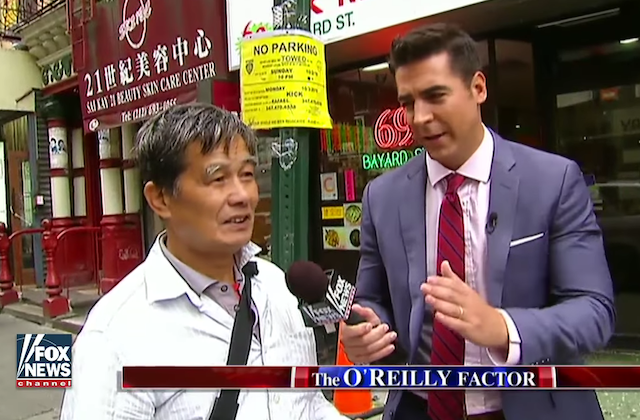Many Asian Americans expressed outrage this week about a segment on Fox News‘ "The O’Reilly Factor" that employed long-perpetuated racist stereotypes to mock New York City’s Chinatown residents. The segment, titled "Watters’ World: Chinatown Edition," featured correspondent Jesse Watters visiting the neighborhood after last week’s presidential debate, in which Donald Trump repeatedly referenced alleged threats from China. Ostensibly attempting to find out what Chinatown residents thought about the election, Watters instead repeatedly mocked those he interviewed. Intercut with movie footage depicting martial arts battles and Lolita-esque Asian schoolgirls, among other caricatures, the interviews caricatured those with limited English-speaking abilities and preyed on stereotypes as old as the first waves of Asian immigration and anti-Asian xenophobia.
From "The Daily Show with Trevor Noah" correspondent Ronny Chieng‘s blistering critique to Asian American Journalists Association president Paul Cheung‘s refusal to appear on Fox News and request for network staffers to attend a town hall, Asian and Pacific Islander Americans (APIA) have derided the segment. The outrage compelled a half-assed non-apology from Watters, who previously mocked Black Lives Matter on the show.
One critic, The New Yorker’s Jiayang Fan, connected that segment to historic bullying of Asian Americans in a sobering new essay. In it, Fan bridges the dehumanizing tropes in "Watters’ World" with the vitriol and anxiety she has faced as a Chinese-American woman:
As I write this, I fear that I am projecting more bravado than I feel. True, the rational, reflective part of me is indignant and affronted. It asks: How can it be that the fastest-growing racial group in America, one that has doubled its share of the electorate in the past decade, is subjected to such crass caricature on national TV? But the other part is a Chinese-American woman who viscerally feels the heat of humiliation as Watters attempts to grind on the street with two Asian-American women while the screen inexplicably cuts to clips of Japanese schoolgirls dancing in pigtails and skimpy uniforms; who feels inward embarrassment when subtitles are inserted for an Asian Hillary supporter who speaks accented but perfectly intelligible English; whose stomach involuntarily drops when Watters harangues an elderly woman who clearly understands little English but is too timid or polite to walk away from an aggressive White man yelling about "Trump beating up on China."
She further connects the bit to a broader electoral climate in which media entities and politicians alike take shots at Asian Americans without fear of repurcussion:
It all seems so backward, but, then again, so is bullying. Watching "Watters’ World: Chinatown Edition," I am reflexively reminded of the shame I felt as a young immigrant with a tenuous grasp of the English language and American culture, whose insecurity mutated into mortification on behalf of my Chinese parents and an inexorable fear that I might remain like them, a perpetual foreigner and an inferior American doomed forever to be at the mercy of those like Watters. To legitimize myself as a proper citizen of this country, there are times when I have wondered, despite myself, how much distance I must place between myself and those whom Watters and Trump feel free to mock. What must I do to impress the bully?
This is the psycho-social climate of intimidation with which the Trump campaign has bedevilled the country. That a buffoon with deplorable manners can endlessly exercise his right to self-satisfied idiocy is a scary thing. Scarier still are the tiny seeds of self-doubt he sows in each one of us who has ever been led to believe that those who insult us might somehow be better than us, that we should be the ones who are embarrassed. That such a man could, one day soon, be the leader of a nation built by immigrants—now, that’s a new kind of fear, and of shame.
Read the full essay here.
